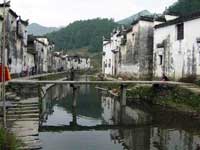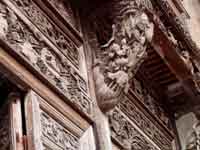|
Simply the best?
By Li Jing (Beijing Weekend)
Updated: 2004-03-18 16:22
 Proud tourism chiefs in Wuyuan, a county of Central China's Jiangxi Province, are making a bold bid to establish their area as a visitor magnet. Proud tourism chiefs in Wuyuan, a county of Central China's Jiangxi Province, are making a bold bid to establish their area as a visitor magnet.
Launching a new promotional campaign in Beijing last week, they unveiled a non-nonsense slogan: "Welcome to Wuyuan - The most fantastic countryside area in China."
Their confidence in Wuyuan is based on its breathtaking natural scenery, well-maintained ancient villages, special folk customs and famous bird paradise.
Located 350 kilometres northeast of Nanchang, capital of Jiangxi Province, Wuyuan was one of the area's best-kept secrets until around 2000.
Wuyuan's visitor appeal is concentrated in several ancient villages, a river, lake and scenic landscape.
The villages of Xiaoqi and Wangkou are the two best-known.
Xiaoqi, also called Xiaochuan, actually consists of two hamlets named Shangxiaoqi and Xiaxiaoqi. According to the Gazetteer of Wuyuan County, during the Qianfu period (874-879) of the Tang Dynasty (618-907), a family by the name of Wang first settled there. They were followed by the Hong, Jiang, Ye and Sun families. Gradually, several tribes were formed.
Shangxiaoqi Hamlet is located near the entrance of a long, narrow valley with a clear stream running through it. Xiaxiaoqi Hamlet is located at the join of the stream and the river at the entrance of the valley. The two hamlets are just a kilometre from each other and are connected by an ancient road paved by bluestone slabs.
 Surrounded by green mountains and trees, the settlements are artfully integrated with the environment. Surrounded by green mountains and trees, the settlements are artfully integrated with the environment.
The human landscape here includes nearly 100 ancient official mansions and houses built during the Ming Dynasty (1368-1644) and Qing Dynasty (1644-1911).
Most of the buildings are three-storey affairs made of wood. The walls at the side of the house are higher than the roof and shaped like stairs towards the top. They are called horse-head walls.
Historically, the Wuyuan people believed that there was nothing more important than the ancestral halls to trace to one's origins and respect one's clan.
Xiaoqi Village boasts several family names and consequently has many ancestral halls.
These have the dual function of mortuary and temple for showing respect to ancestors and as meeting place for big clan events.
From ancient times, the Xiaoqi people have followed environmentally-friendly maxims. These include the idea that "trees help the living of people and water helps to earn money?and points out that future generation will regret having no trees in front of and behind the village.
 Such beliefs lie behind the Xiaoqi people's support of afforestation. Trees more than 200 years old can be found everywhere around the village. Such beliefs lie behind the Xiaoqi people's support of afforestation. Trees more than 200 years old can be found everywhere around the village.
Wuyuan is also famous for its tea plantation. During the spring, tea trees sprout all over the hills and mountains around the village. The green lines of tea trees bring a delicate fragrance to the mountainous village.
A number of other villages ?such as Wangkou, Yancun and Liken ?are almost the same the style as Xiaoqi Village.
Yuanyang Lake (Mandarin duck Lake) is home to thousands of wild ducks inhabiting Fuchun Town, Wuyuan. It is considered to be the world's largest winter habitat for wild mandarin ducks.
The vast area of rape flowers in spring around these villages is another major attraction for visitors.
How to get there:
Flights are available from Beijing to Huangshan, Jiujiang and Nanchang. Huangshan is 110 kilometres from Wuyuan Town. Bus is the most convenient way to Wuyuan or to these villages from Wuyuan Town. Flights fromBeijing to Huangshan cost around 800 (US$96) after discount.
Train routes from Beijing pass through Jingdezhen, about 80 km from Wuyuan. There are also train routes to Jiujiang, Huangshan and Nanchang. They cost around 300 yuan (US$36) for a sleeping berth.
|
